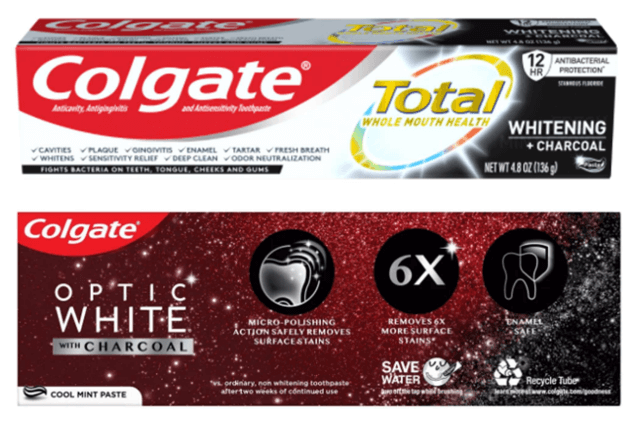Class Action Claims Colgate Falsely Advertised Charcoal Toothpaste as Safe
by Erin Shaak
Last Updated on January 24, 2024
Bermudez et al. v. Colgate-Palmolive Company
Filed: December 22, 2021 ◆§ 1:21-cv-10988
A lawsuit claims Colgate charcoal toothpaste is falsely advertised as safe for everyday use despite that charcoal has been shown to be damaging to oral health.
A proposed class action claims Colgate has falsely advertised its charcoal toothpaste products as safe for everyday use despite the fact that many studies have shown charcoal to be damaging to oral health.

According to the 40-page case, Colgate-Palmolive Company’s charcoal oral care products—including the Colgate Total Whitening + Charcoal Toothpaste and Colgate Optic White with Charcoal Teeth Whitening Toothpaste—are represented as, among other things, “enamel safe” and able to promote “total mouth health.” The suit alleges, however, that charcoal has been shown to be unsafe for use in oral care products, and can damage a user’s teeth and gums.
Per the lawsuit, Colgate has falsely advertised and deceptively misbranded its charcoal oral care products in order to sell the toothpaste at a premium price to consumers who are unaware of the potential dangers associated with using charcoal items. The case alleges that the Colgate charcoal oral care products are “at best a ‘marketing gimmick’ and, at worst, harmful to teeth, dentistry implants and overall oral health.”
The lawsuit states that “enterprising companies” such as Colgate have been “inspired” by charcoal’s known limited applications—such as its abilities to absorb certain drugs or toxins when administered correctly in an emergency room and extract certain substances from water—to apply them to a “much broader context” despite lacking substantiation for such expanded uses. According to the suit, charcoal has been marketed as “capable of extracting nearly any undesirable element or substance, and in nearly any context.”
The general consensus of dentists, researchers and industry experts, however, is that charcoal should not be used in oral care products, the case argues. Notably, the American Dental Association has not approved any charcoal toothpastes for its Seal of Acceptance, which is recognized as a certification of a product’s safety and efficacy based on clinical data and research, the suit says.
Moreover, the lawsuit states that many studies have found that charcoal is more abrasive than whitening toothpastes and can become embedded in cracks or defects on a person’s teeth or implants, leaving fine black lines that cannot be removed. Per the complaint, a spokesperson for the American Dental Association warned that using abrasive materials in toothpaste “can actually make your teeth look more yellow, because it can wear away the tooth’s enamel and expose the softer, yellower layer called dentin.”
All told, the lawsuit alleges Colgate was well aware of the concerns raised by industry experts over the use of charcoal in toothpaste yet has failed to disclose the “potentially serious consequences” of using its charcoal toothpaste products.
The plaintiffs claim to have relied on Colgate’s representations of its charcoal toothpaste’s safety and efficacy when they chose to purchase the products. One of the plaintiffs says, however, that the toothpaste “abrad[ed] his enamel and crack[ed] his front teeth,” while the other plaintiff claims the toothpaste wore away her enamel as well.
Get class action lawsuit news sent to your inbox – sign up for ClassAction.org’s newsletter here.
Video Game Addiction Lawsuits
If your child suffers from video game addiction — including Fortnite addiction or Roblox addiction — you may be able to take legal action. Gamers 18 to 22 may also qualify.
Learn more:Video Game Addiction Lawsuit
Depo-Provera Lawsuits
Anyone who received Depo-Provera or Depo-Provera SubQ injections and has been diagnosed with meningioma, a type of brain tumor, may be able to take legal action.
Read more: Depo-Provera Lawsuit
How Do I Join a Class Action Lawsuit?
Did you know there's usually nothing you need to do to join, sign up for, or add your name to new class action lawsuits when they're initially filed?
Read more here: How Do I Join a Class Action Lawsuit?
Stay Current
Sign Up For
Our Newsletter
New cases and investigations, settlement deadlines, and news straight to your inbox.
Before commenting, please review our comment policy.